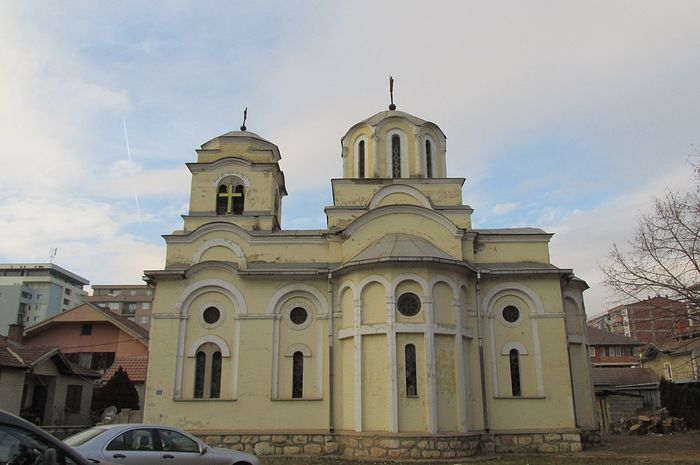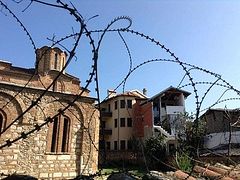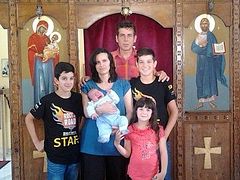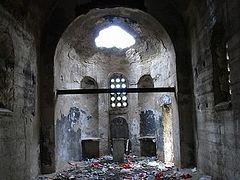There is a small town called Kosovo Polje several miles away from the city of Pristina. It is clear from its name that it is situated near the historic and spiritual center of the region—the very battlefield [the Serbian word “polje” means “field”.—Trans.] where Holy Prince Lazar of Serbia with his army made the difficult yet right choice, which led to their salvation: “It is better to die for Christ now and dwell with Him in eternity than to save my life now and live in everlasting shame.” Having suffered a defeat in a battle on earth because of the betrayal of some soldiers, the Martyrs of Kosovo won a spiritual battle. Do their descendants remember this? How do they live in Kosovo? And can we call it a life? It appears, as Fr. Nikola Dragicevic, rector of the Church of Great Martyr Catherine in Kosovo Polje, believes and shows by his own example, that not only is it possible, but it is just the beginning of life when you make Christ the cornerstone of your existence. Our talk with Fr. Nikola is dedicated to this.
Barbed wire as a reason to remember Christ
—Fr. Nikola, is your church community large? How many parishioners do you have? Where do they live?
—There are currently fifty permanent parishioners who attend church services regularly. They reside in four Serbian villages near Pristina, namely Kosovo Polje, Kuzmin, Ugljare, and Batuse.
—How often do you hold services at your church?
—On Sundays and major Church festivals. For the time being it is difficult for us to worship every day.
—Serbs don’t feel safe in their spiritual motherland—that is, in Kosovo and Metohija; I have first-hand knowledge of this. Judging by the statistics of the past (and relatively peaceful) years alone, the number of Serbian families has been steadily falling here. Local provocations are commonplace here—I saw this for myself during my stay in Kosovo Pomoravlje. What can you say about the situation in central Kosovo? Can Orthodox believers feel safe when they come to church there?
—That is a difficult question. First and foremost, Serbs come to church with faith in God in their hearts—in my opinion, that is the main condition for safe movement. Getting to our church is not so difficult for the faithful as public transport works fairly well. But when you travel from a village that is enclosed by barbed wire, it’s another thing. I assure you that though this sense of leaving your enclave and “breaking through” barbed wire is strong, it is far from joyful. Living under these conditions is like living in captivity. But we have gotten used to this. The faith is of paramount importance here.
“Praying meekly for your enemies takes superhuman efforts”1
 Fr. Nikola with his daughter Ana —Besides Serbs, do any Albanians come to your church? I have heard about such examples in Kosovo when Albanians came to the monastery “on the sly” and have even converted to Orthodoxy.
Fr. Nikola with his daughter Ana —Besides Serbs, do any Albanians come to your church? I have heard about such examples in Kosovo when Albanians came to the monastery “on the sly” and have even converted to Orthodoxy.
—This takes place in monasteries of Metohija. True, there are several happy stories which give us hope for the preservation of Kosovo and Metohija’s Orthodox heart. But here, in an ordinary church near Pristina where we are within sight of each other, we haven’t experienced anything like that yet. But it doesn’t mean we are not praying for our neighbors and their enlightenment with the light of the faith of Christ.
—What is the main problem the Orthodox of Kosovo and Metohija are facing today?
—Life behind barbed wire, as if you were a captive, is perhaps the biggest challenge. And there are all the consequences of this: the impossibility to move around Kosovo and its surroundings freely, to speak your native language in your native region freely, attacks on Serbs in remote and old villages, and provocations. To be honest, life is full of dangers here. But the presence of God is more evident here than in “hothouse conditions”. This experience is worthwhile. Since we often forget God, He has to remind the forgetful Orthodox of Himself, even by such painful ways. Russians, know it from their own experience: the Lord kept reminding them of Himself throughout the twentieth century. The Russian Church has produced so many New Martyrs and Confessors, beginning from the Tsar-Martyr Nicholas II!
Our life is anything but boring
—Fr. Nikola, why did you and your family decide to live and serve in Kosovo and Metohija when you could be living more or less peacefully and comfortably in “greater Serbia”?
—We didn’t come here in pursuit of a “comfortable life”. It is Christ Whom we seek. My father, who was a priest like me, served in Velika Hoca, our enclave in the south of Metohija, for fifty years. So I followed in his footsteps and later completed the Theological Seminary in Prizren. I must have absorbed the spirit of Prizren so thoroughly that I cannot imagine my life without Kosovo and Metohija. So I still serve in Kosovo to which I have I taken my wife and children. This was thirteen years ago. Despite all the difficulties I have never heard my wife murmur over the years. Her name is Zorica. I am blessed to have such a good wife! I ask everybody to pray for her and for our children Filip and Ana.
 Zorica Dragicevic —Is there any chance for your children to get good schooling in Kosovo?
Zorica Dragicevic —Is there any chance for your children to get good schooling in Kosovo?
—Currently the level of education is very poor here—the teachers are weak, and there are no extracurricular activities for kids. With the help of God we are already used to living and working in hard conditions. We train our children a lot at home: We read, do their homework together, and so on. Our life is anything but boring.
—The church where you serve is situated in Kosovo Polje. This place is historic, tragic, and holy at the same time. Do you feel that it is special?
—Certainly! Here you feel the feat of the Kosovo Martyrs not only mentally, but also spiritually and even physically, feel the prayers and intercession of the Holy Prince Lazar. For him spiritual freedom was more important than physical slavery—I am sure it is something he calls the Serbian people to even today. Freedom with Christ is stronger than any slavery in the world.
—Does your church have a Sunday school? Do children attend services?
—Our church still has no Sunday school, but Serbian schools in Kosovo and the church in Prizren have the subject, “the science of faith”, as we call it.
When can you forget Kosovo?
—Can we say that for the Serbs living in Kosovo church is like home in spite of everything?
—Of course we can. It was the Church that kept the communities and people in order to survive and remain in Kosovo. Serbs are united around churches here; if we unite around something or somebody other than Christ, this will take us nowhere. Once we have put something else in place of Christ, whether it be politics, economics, money, etc., we can forget Serbian Kosovo. This is not what the Holy Prince Lazar exhorted us to do.
 St. Catherine’s Church in Kosovo Polje
St. Catherine’s Church in Kosovo Polje
—Do any pilgrims come to St. Catherine’s Church?
—Very few people come here. But we do see a great influx of pilgrims from Serbia and other Orthodox and non-Orthodox countries to ancient monasteries and churches, such as Pec Monastery, Visoki Decani Monastery, Gracanica Monastery (it is close by), Draganac Monastery, and other places.
Why is it impossible to forget Kosovo?
 Long live Russia! —What does the average day of an average Orthodox priest in Kosovo and Metohija look like?
Long live Russia! —What does the average day of an average Orthodox priest in Kosovo and Metohija look like?
—Life as usual! Church services, journeys to the villages that make up our community, talks with parishioners, and pastoral care—this is our day-to-day work. When people call me and say: “Father, can you come to us for a couple of hours to discuss something?”, I dart off and go to them. I think that is logical; they need a priest who cares about their problems and is ready to share in their pain and joy. By the way, we have a lot of joy here, so don’t think that a general feeling of gloom and doom prevails here! So I try to be a priest of that kind. What else? The customary duties of any church rector: clearing church walls, sweeping, laying in firewood, paying for housing and communal services, planting shrubs, watering flowers, doing some work with the kids at home—the things any church rector is familiar with.
—What would you say to your Orthodox brothers and sisters from the north?
—Do come to us! You will see that Kosovo and Metohija is not so much geography or geopolitics as it is our spiritual home—Christ and the Truth are closer here. Here, in the “Serbian Jerusalem”, your brothers and sisters—your co-religionists to whom you are related by blood—are waiting for you. We understand one another without interpreters, don’t we? By the by, is it true that “vredan”2 means “diligent”, “hard-working”?
—Given your strong desire to preserve Orthodoxy in Kosovo, you Serbs are very “vredan”.
—May the blessing of God be with Russia, our brother nation. You are always welcome here. I can’t wait to pray with you in our church.
1. A line from the poem Prayer by the Russian poet Sergey Bekhteev (1879-1954), whose poetry is imbued with the spirit of Orthodoxy, patriotism, and loyalty to Russian monarchy. In 1920 he emigrated to Serbia and from 1930 lived in Nice, France.
2. In reality, the Russian adjective “vredny” has multiple meanings, among them are “obstinate”, “uncompromising”.






